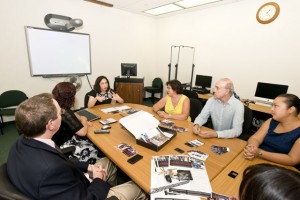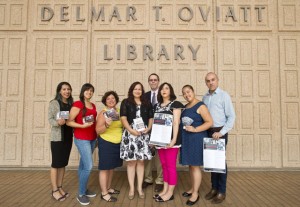CSUN’s Oviatt Library Receives Grant to Promote Local Latino/a History
Through a joint grant from the American Library Association and the National Endowment for the Humanities, the California State University, Northridge’s Delmar T. Oviatt Library will host a program that works with local Latino/a community centers to synthesize classroom and community experiences into one program — to paint a broader picture of Latino American history.
Grant coordinators Jennie Quinonez-Skinner, Luiz Mendes, and Isis Leininger are heading the yearlong project, which will be focused on delving deeper into topics highlighted in a PBS documentary series titled “Latino Americans: 500 Years of History.”
“We are showcasing the six segments of this documentary,” she said. “It really helps bring about the richness of the Latino history in the U.S.”
The project will explore various aspects of Latino American history, such as their influence in the Hollywood film industry, veterans of foreign wars and public art projects in the San Fernando Valley.
Quinonez-Skinner explained that the wide variety of topics the documentary series covers gave her department a chance to bring in other groups — such as the CSUN Veterans Resource Center, the library’s Creative Media Studio and local public entities — for an opportunity to work together on telling the history of Latino Americans from a more personal perspective.

Grant coordinator Jennie Quinonez-Skinner, center, discusses the upcoming events for the year-long project on “Latino Americans: 500 Years of History,” with team members in the library. Photo by David J. Hawkins.
“We have a huge amount of diversity in the U.S.,” she said. “It is important to encourage Latino Americans to share their stories in different ways.”
Mendes is reaching out to local libraries and community centers for the program. He said he is inspired by these collaborations because they provide a different approach to learning.
“One of the things we wanted to focus on is the partnership between the academic institution and the local cultural heritage,” he said. “We can design programs and activities that will educate [the community] about Latino Americans, their culture, their history — while going beyond the traditional walls of the academic institution.”
Fellow team member Veronica Muncal described the program as a path for other cultures in the region to be discussed.
“CSUN is such a diverse campus — that is one of the things that made me excited for this,” Muncal said. “I see this as a door opening for other cultures as well. I am Filipino, and I have a place in the Latino community [in Los Angeles]. It’s interesting to see a wider view of Latino history here.”
Quinonez-Skinner said she believes the program will provide a more open story of Latino American history.
“For a lot of us, no matter our backgrounds, we hear the singular story of a culture,” she said. “There is so much more. We want to make some great connections, provide more access to these scholarly topics to a wider audience and see ourselves in another light.”
“Latino Americans: 500 Years of History,” will be shown in six segments. Showings begin on Sept. 16 and end on April 2, 2016. For information on locations and times of showings and events, visit library.csun.edu/latino-americans.


 experience
experience